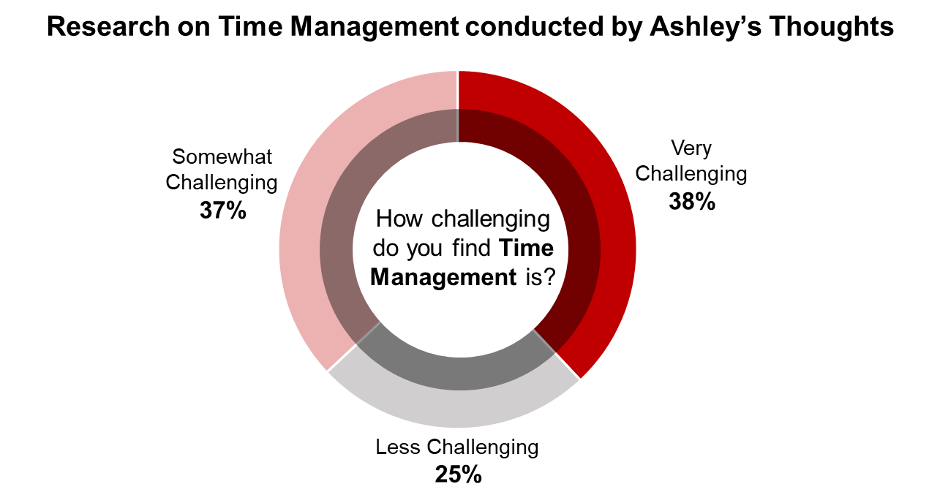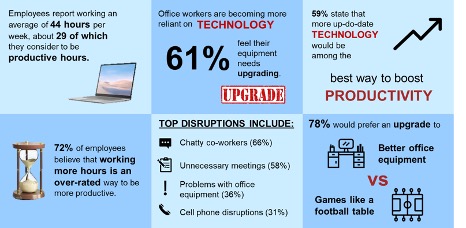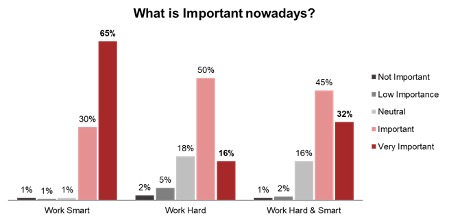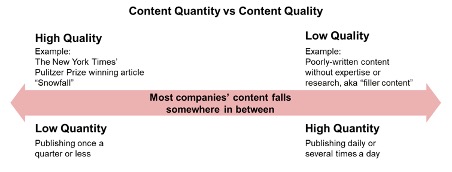 Time Management is the act of exercising and planning conscious control of the time spent on certain specific activities to increase efficiency, effectiveness, and productivity. It involves judging various demands from a person to social life, hobbies, family, work, and commitments with the finiteness of time. By using time effectively, one owns the “choice” on managing and doing daily activities based on their expediency. However, based on research on Time Management conducted by Ashley’s Thoughts, 38% of the respondents find time management very challenging, followed by 37% who finds it somewhat difficult (Figure 1).
Time Management is the act of exercising and planning conscious control of the time spent on certain specific activities to increase efficiency, effectiveness, and productivity. It involves judging various demands from a person to social life, hobbies, family, work, and commitments with the finiteness of time. By using time effectively, one owns the “choice” on managing and doing daily activities based on their expediency. However, based on research on Time Management conducted by Ashley’s Thoughts, 38% of the respondents find time management very challenging, followed by 37% who finds it somewhat difficult (Figure 1).

Figure 1
On the other hand, work productivity is an assessment of the efficiency of an individual or a group of people. The word “productivity” can be evaluated as the output of an individual given a specific period. In general, in the workplace, a worker’s productivity will be assessed relative to an average of employees doing a similar job. As the workforce’s productivity plays a vital role in the success of any organisation, many businesses take their employees’ productivity very seriously. Benefits of Practicing Time Management Reduction in Stress Level Good time management helps to reduce stress levels as it contributes to the achievement of goals within the prescribed deadlines. One who manages his or her time correctly tends to become successful within a short period and is often less stressed. On the other hand, individuals who do not organise their life correctly are likely to end up with compiled workloads and a high-stress level. Stress contributes to a person’s habit of procrastinating and failure to achieve the goals set. This will affect one’s work schedule. Hence, time management helps reduce stress as it enables one to achieve better outcomes within a specific timeframe. Financial Soundness Time management is a critical factor of success and being successful brings financial benefits. In thecurrent society that we live in, wealth is one of the more prominent determinants of success. One will only become financially sound if they have planned their life wisely and maintain their professional and personal life timetable. Planning is always easy, but when it comes to obeying a planned schedule, self-discipline and practical time management skills are required. The lasting experience gained via time management empowers one with knowledge and skills that can be applied to daily life. Someone who can manage their time correctly can complete things on time and subsequently amass more money, leading to better financial security. Since knowledge is wealth, time management allows one to allocate their time wisely to acquire new skills and insights, leading to greater professional growth and with that, improved career prospects. Self-Confidence Time management allows one to gain self-confidence. It is crystal clear that self-confidence plays a vital role in our life; those with self-confidence tend to have a positive mindset compared to those who do not. This is because people who lack confidence usually depend on others to solve problems and complete tasks, which has affected their ability to be successful. Conversely, one with self-confidence tends to achieve their goals within a short time frame due to their willingness to take risks. Individuals will feel satisfied and confident after being able to make decisions punctually while planning their work in a more structured and organised fashion. Time management does not occupy one’s time; contrarily, it creates extra time. A confident person can do anything, and self-trust takes one’s confidence to the next level. As a result, one can attain greater self-confidence if and when they manage their time wisely. Decrease Procrastination Time management reduces procrastination. Life is full of ups and downs. One of the benefits of practising time management is the capability to control unpredicted situations and events. There are no additional or special skills needed to master time management; the only thing required is the knowledge to implement discipline in day-to-day activities. Unfortunately, procrastination has been one of the factors that negatively affect our path to success. However, time management allows one to get rid of or at least minimise the habit of procrastinating, enabling people to carry out their tasks as scheduled. The ability to focus on a task Time management allows one to focus on a specific task. Since time management reduces one’s stress level, it enables them to focus on their performance and targets while accomplishing a particular task. Someone with the ability to focus on their duty is more likely to achieve a goal faster than those who struggle in whatever they are assigned to. Everyone desires to be successful in life, but it is easier said than done. To be successful and have an enjoyable experience, one needs to have a focused view of every single step as it is the key to success. Therefore, to focus on a task and complete it on time, one must manage his or her time. Figure 2 below shows the summary of the benefits of practising time management:
Figure 2
How to maximise Work Productivity? Based on research conducted by Fellowes, almost half of office workers feel an increased pressure to be more productive at work. The outcome of the survey is shown in Figure 3. And here is the question, how can we maximise our work productivity, especially in the workplace?
Figure 3
Employee Motivation Motivation is defined as the psychological feature that drives an employee to act for a targeted goal; the rationale of action gives direction and purpose to one’s behaviour. Therefore, one’s work input and output are hugely influenced by his or her motivation. According to Huber, motivation contributes to approximately 20% to 90% of employee productivity. Therefore, companies will need to motivate their employees to work from time to time as it is salient in achieving their objectives and goals. To boost an employees’ motivation level, companies should occasionally organise motivational talks, which can be done by inviting the right professional speakers. This action will encourage employees to put in more effort while working, increasing their work output and ultimately, propelling the company to its targeted goals. Furthermore, companies should also review employee pay and benefits, regularly for their best performers. This is because financial incentive is always vital in motivating employees to be more efficient and productive. It will also increase one’s job satisfaction. Financial incentives can usually be carried out in various ways, such as Profit-Sharing Scheme, Work-Life Programs, etc. Nurturing Innovation Innovation in a team can be defined as starting something for the first time, something which has not yet been done by anyone else. This is also known as pioneering. This is more likely to arise via studies or experiments. Innovation can be termed as the brainchild of employees’ creativity. Proper motivation is also needed to foster appropriate innovation in a department. One must have a clear understanding and guideline on what innovation is and what it entails. To promote innovation in a team, companies should adopt a free flow of ideas within a group. For example, members are given the freedom to exchange and share information and ideas for the betterment of the company. Companies can propose an award scheme for the most innovative thoughts, and the reward can be in the form of salary bonuses, gifts, raises, and others. Companies must also make sure that the owner of an implemented idea gets recognition for their contribution to the workspace. Besides that, the company must also be able to avail sufficient resources, funds, and time to facilitate research, design, testing and implementation, of the innovative ideas proposed. Each team membershould be encouraged not to give up easily and to take risks with their ideas. They should also be motivated to continuously learn from past mistakes and grow. Employee Diversity Employees in a company are usually made up of individuals from different economic, social, cultural, and spiritual backgrounds. Companies must treat all employees fairly and equally without bias and assure workers that their beliefs are respected and accepted. This might be a challenge since companies tend to have a diverse team of employees. However, a company must learn to respect its employees’ beliefs and make them feel at home while working in the company. This will increase their productivity, as well as work output. The optimal way to tackle this obstacle is by organising a diversity awareness campaign in the company. Through the diversity awareness campaign, the company will be able to obtain feedback from their employees on the issue at hand. At times, consultants and experts can also be hired so that employees are given a platform or opportunity to voice out their concerns on how diversity can be better managed. At the same time, experts play a role in encouraging the employees to work and collaborate as a team. Work Productivity: Work Hard vs Work Smart
Figure 4
Figure 4 above shows empirical research based on data collected from anonymous questionnaires distributed to a group of employees working in a private company. Most of the employees (approximately 65%) agreed that the ability to “work smart” is vital to compete in a global labour market. This emphasises the importance of being able to “work smart” than “work hard”. A hard worker is a person who consistently works towards what he or she perceives to be worth working on, regardless of how dynamic the situation might be. Success for hard workers does not come overnight but only after spending long hours at work and depriving themselves of the comforts of life. On the other hand, a smart worker is a person who works towards what they perceive to be worth working for and apply their brain and efforts most efficiently with the help of integration of both. This guarantees successful results without wasting human energy. The diagram below shows the comparison between work hard and work smart.
Figure 5
To summarise, hard work is carried out with extensive physical effort but minimal use of the brain, whereas smart work is carried out with more brain usage and techniques and less physical effort. Hard work is when someone does things without adequate planning, while intelligent work is when work is done via the process of planning without any physical stress. Hard work might generate a high cost during the completion of the task, whereas brilliant work contributes to work done at a minimum price. Lastly, hard work will never fail, while intelligent work does fail sometimes. Work Productivity: Quantity vs Quality
Figure 6
Figure 6 above shows an example of Quality versus Quantity. Quality is a measure of excellence or a state of being. It describes something, either how it was made or how it was compared to the others. It is often subjective to each individual’s point of view. For example, one might think that an object has a good quality, while others might not think so. Furthermore, quantity is the size, sum, or extent of something. It is countable, measurable, and can be expressed as a numerical value. Therefore, one can never dispute quantity. For instance, if there are five cars, one cannot claim that there are four or six. In business, there has been continuous debate over the topic of Quantity vs Quality. Many bosses and managers tend to focus only on the quantity instead of the quality of their employees’ work. At the same time, some prioritise both quantity and quality in the shortest possible time. A minority of them preferred quality over quantity. Conclusion: In a nutshell, time management is making full use of one’s available time. It is essential in one’s professional and personal life because it helps us do the right things at the right time. The advantages of practising time management outweigh its disadvantages. Making full use of time management tools such as planners, to-do lists, weekly and long-term calendars will increase one’s organisation skills and help to eliminate procrastination. As you get better at managing your own time, you will find that your work productivity will improve. So, give it a chance and start managing your time! It is better to be late than never. Girish Ramachandran is the Executive Director of 27 Advisory Sdn Bhd. He is a Research Fellow with the National Human Resource Centre (NHRC) of HRD Corp. The views expressed here are entirely the writer’s ownAshley’s Thoughts. 2021. Investigation 1. [online] Available at: https://ashleybritt595.wordpress.com/2014/10/26/investigation-1 [Accessed 16 June 2021].
En.wikipedia.org. 2021. Time management – Wikipedia. [online] Available at: https://en.wikipedia.org/wiki/Time_management [Accessed 16 June 2021].
User, S., 2021. Advantages of Time Management – EssayModo.com. [online] Essaymodo.com. Available at: https://www.essaymodo.com/en/advantages-of-time-management [Accessed 16 June 2021].
WhatIs.com. 2021. What is employee productivity? – Definition from WhatIs.com. [online] Available at: https://whatis.techtarget.com/definition/employee-productivity [Accessed 16 June 2021].
Fellowes.com. 2021. Workplace Productivity Survey Findings – Fellowes®. [online] Available at: https://www.fellowes.com/us/en/resources/healthy-productivity/business-professional-infographic.aspx [Accessed 16 June 2021].
StudyMoose. 2021. Employee Productivity Free Essay Example. [online] Available at: https://studymoose.com/employee-productivity-essay [Accessed 16 June 2021].
UKEssays.com. 2021. Improving Workplace Productivity. [online] Available at: https://www.ukessays.com/essays/business/a-look-at-ways-of-improving-workplace-productivity-business-essay.php [Accessed 16 June 2021].
Fragouli, E. and Ilia, I., 2021. “Working smart and not hard”: key to maximize Employee efficiency?. [online] Semanticscholar.org. Available at: https://www.semanticscholar.org/paper/%E2%80%9CWorking-smart-and-not hard%E2%80%9D%3A-key-to-maximize-Fragouli-Ilia/6b2128b2348b0fb571d447428035faa08d326fae/figure/1 [Accessed 16 June 2021].
Issuu. 2021. HARD WORK Vs. SMART WORK. [online] Available at: https://issuu.com/pauledutech/docs/hard_worker.docx [Accessed 16 June 2021].



